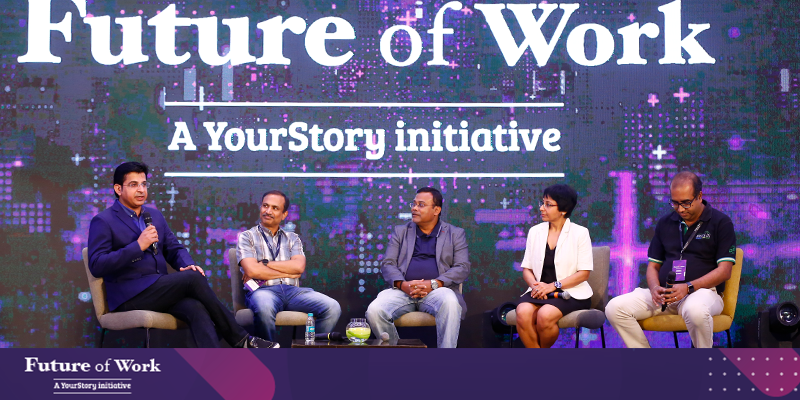
Add Your Heading Text Here

No conversation around technology today is complete without a reference to artificial intelligence (AI). While the term AI has been around for decades, in recent times, its application across industries, from mining to healthcare, education and finance, among others, is changing the way we live, both at work and at home.
The increasing ubiquity of AI can be attributed to greater processing power and the declining cost of achieving these tasks at increased speeds. The adoption of AI has been so rapid that technology leaders across industries can no longer ignore it for long-term and sustained financial growth.
At the third edition of YourStory’s Future of Work event in Bengaluru on Saturday, AI was the focus of a panel discussion, which drew attention to ‘How AI is disrupting business models and value chains and unleashing transformative and innovative growth opportunities’.
The session was moderated by Sameer Dhanrajani, CEO and Co-founder, AIQRATE, and the panelists were Rajan Sethuraman, CEO, LatentView Analytics; Soumendra Mohanty, EVP Analytics and COO, Tredence; Prithvijit Roy, CEO and Co-founder, BRIDGEi2i; and Iqbal Kaur, Co-Founder, Zylotech. The discussion yielded many insights on the top trends around the technology.
1. Experiments at scale are the need of the hour
It is clear that we are at a stage where we need to experiment at scale.
He added that companies needed to run a lot of experiments. “From a team perspective, I would say how do you figure out how to run multiple prototypes, channels, and experiments.”
2. Every company today is a technology company
CXOs today are concerned with the outcome that they can deliver. “Today, businesses have realised that they are all into technology, regardless of the vertical they operate in,” Iqbal said.
Prithvijit added, “As consumers, we are primarily operating from our mobile devices and have come to expect the same level of experience, whether it is ordering food, booking a cab, or any other service. So, a CXO has no other option but to rethink the way the business operates if s/he wants to remain in business. That’s where data, automation, and AI will be the game-changers.”
3. Disruption is the new normal
Giving the example of Niramai. Ai, Rajan said the healthtech startup was using thermal sensors instead of X-rays to create images that would then be analysed using AI to make more accurate predictions and diagnoses of breast cancer.
“This allows for faster and more accurate treatment. Disruption is possible in several places, and companies and industries are still understanding use cases where AI can be used.”
4. Understanding the AI ‘playbook’
Companies further along their digital tranformation journey are better poised to leverage AI.
“If a company’s core processes are not digitised, then there is not enough data, and AI is a monster that needs to be fed a lot of data. One of the reasons many of our clients did not do well in their AI journey was that a lot of their processes were not digitised. So, we took a step back in the value chain and created that data,” Iqbal said.
“Secondly, we often treat AI as a toy, an experiment, or an innovation. We forget who the main consumer of whatever we are creating is and whom we are disrupting for. If we keep the consumer in mind and have clarity on the problems we are trying to solve, that’s where the magic happens.”
5. Humans and AI will solve problems together
Prithvijit said we were already on the journey where this collaboration is happening.
When leveraged correctly, AI will bring about positive advances that will disrupt value chains across the economy. However, companies will have to guard against misinformation and manipulated and false data that can corrupt output, and AI developers need to be suitably prepared.
Read more at: https://yourstory.com/2020/03/future-of-work-2020-ai-disrupting-businesses

